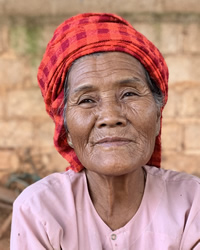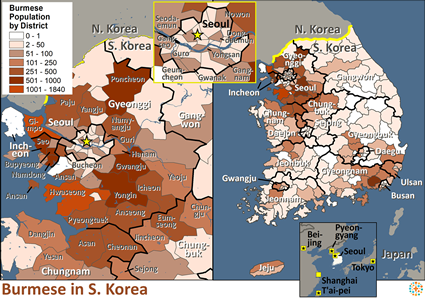Originally from the hills of Tibet, the Burmese are now the political, economic, and religious leaders of Myanmar, formerly called Burma. Burmese history is a chronicle of wars and rebellions. Ethnic divisions and political unrest have been common since the first Burmese kingdom in the eleventh century. Consequently, the Burmese have lived in constant instability, fear and bitterness. Amid such turmoil, some fled to the relative stability of other countries such as Singapore. Those who went to Singapore were usually people with money and valuable, marketable skills.
Burmese people in South Korea came there either as political refugees or as businessmen.
The Burmese in Singapore practice Buddhism, the major world religion based on the teachings of Siddhartha Gautama or the Buddha, who lived in the 6th and 5th century BC in ancient India. The Buddha taught the Four Noble Truths by which one can gain spiritual knowledge and escape the endless cycles of reincarnation. Theravada, one of the two major branches of Buddhism, declares that by following the Noble Eightfold Path of right intentions and right actions that a Buddhist can achieve nirvana or a state of freedom and salvation. Mahayana Buddhism, the other main branch of Buddhism, asserts that by following the six perfections that a Buddhist can move along the path to Enlightenment. To most Burmese, however, these things have far less meaning than their traditional beliefs, which are usually animistic. In animism, evil spirits must be appeased through prayers, sacrifices and rituals. Buddhism allows people to mix Buddhist teachings with traditional religion. Two of the important Buddhist yearly holidays are Vesak, the Buddha's birthday celebrated in May or June and Bodhi Day, the holiday which commemorates the day that the historical Buddha experienced enlightenment under a Bodhi tree.
The Burmese people in South Korea need to submit to Jesus Christ so they can experience the abundant life He offers them in John 10:10.
Pray for God's protection of the Burmese people in South Korea. Pray that the Burmese people will have a spiritual hunger that will open their hearts to the King of kings. Pray for workers who are driving by the love and boldness of the Holy Spirit to go to them. Pray for a Disciple Making Movement among them.
Scripture Prayers for the Burmese in Korea, South.
| Profile Source: Joshua Project |


























